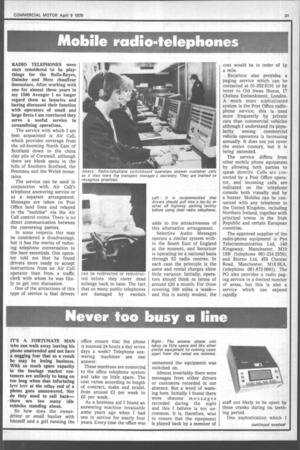Mobile radio-telephones
Page 33

If you've noticed an error in this article please click here to report it so we can fix it.
RADIO TELEPHONES were once considered to be playthings for the Rolls-Royce, Daimler and Merc chauffeur limousines. After working with one for almost three years in my 1500 Avenger 1 no longer regard them as luxuries and having discussed their function with operators of small and large fleets I am convinced they serve a useful service in streamlining operations.
The service with which I am best acquainted is Air Call, which provides coverage from the oil-booming North East of Scotland down to the china clay pits of Cornwall, although there are blank spots in the hills of Southern Scotland, the Pennines and the Welsh mountains.
The service can be used in conjunction with Air Call's telephone answering service or as a separate arrangement. Messages are taken on Post Office land lines and relayed to the "mobiles" via the Air Call control rooms. There is no direct communication between the conversing parties.
In some respects this may be considered a disadvantage, but it has the merits of reducing telephone conversation to the bare essentials. One operator told me that he found drivers more ready to accept instructions from an Air Call operator than from a traffic clerk with whom he was likely to get into discussion.
One of the attractions of this type of service is that drivers adds to the attractiveness of this alternative arrangement.
Selective Audio Messages operate a similar system within the South East of England at the moment, and Securicor is operating on a national basis through 52 radio centres. In each case the principle is the same and rental charges show little variance. Initially, operators should think in terms of around £20 a month. For those covering 500 miles a week— and this is surely modest, the cost would he in order of lp a mile.
Securicor also provides a paging service which can be contacted at 01-3528191 or by letter to Old Swan House, 17 Chelsea Embankment, London. A much more sophisticated system is the Post Office radiophone service; this is used more frequently by private cars than commercial vehicles although I understand its popu larity among commercial vehicle operators is increasing annually. It does not yet cover the entire country, but it is being extended.
The service differs from other mobile phone equipment by allowing both parties to speak directly. Calls are connected by a Post Office operator, and incoming calls are indicated on the telephone console both visually and by a buzzer. Mobiles can be connected with any telephone in the United Kingdom, including Northern Ireland, together with principal towns in the Irish Republic and certain European countries.
The approved supplier of the radio-phone equipment is Pye Telecommunication Ltd, 140 Kingsway, Manchester, M19 1BB (telephone 061-224 3358); and Storno Ltd, 455 Chester Road, Manchester, M16 9EA, (telephone 061-872 0661). The PO also provides a radio paging service in a limited number of areas, but this is also a service which can expand rapidly.




























































































































